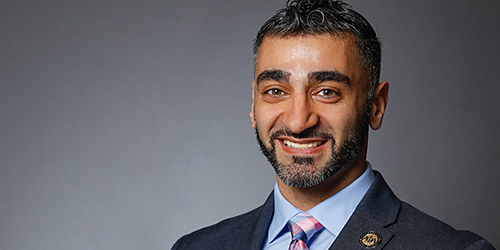Introducing Dr. Hatef Alavi
Introducing Dr. Hatef Alavi

In some ways, the hard work…the sacrifice and study…the years of “grinding it out,” as he says…are complete.
But, in other ways, the work—serving students who seek the opportunities that a college education provides—is just beginning for Hatef Alavi.
Make that Dr. Hatef Alavi.
“My goal is to use my story and voice as a platform to motivate and inspire others in everything I do,” says Alavi.
Flash back to 2004. Alavi interviewed for Rowan University’s EOF/MAP program for undergraduates. The counselor offered him admission on the spot.
Suddenly, the 19-year-old who knew virtually no English just six years before…who had unimpressive SAT scores…who was told in high school that he wasn’t college material…was a freshman psychology major.
He vowed that day—and every day thereafter—not to squander the chance he’d been given.
“That was it,” says Alavi, 34, who earned his bachelor’s degree in 2009. “That was the only opportunity I needed to prove to myself and to my parents that I belonged in college.”
This spring, Alavi, who scored just 670 on his first SAT test—“You get 200 points just for your name,” he says—earned his doctorate in educational leadership/higher education from Rowan’s College of Education.
Alavi’s story is one of sacrifice, determination and passion…his and his family’s.
In 1998, his parents moved the family from Iran for the United States with a singular goal: to give Alavi and his brothers the opportunity for a great education and a better life.
They lived comfortably in Iran. His father was a retired banker. But unrest and few prospects for good careers led them to seek visas to America. They settled in Ocean Township, Monmouth County, five of them living in a two-bedroom apartment.
His father took a job in the factory of an engineering company and worked part-time at Macy’s. His mom also worked at Macy’s.
Finding community
Then 13, Alavi knew just three phrases in English. For two years, he carried a dog-eared English dictionary everywhere, painstakingly translating words from Farsi.
“I struggled fitting into the culture,” says Alavi. “It was hard for me to find that sense of belonging, that sense of community.”
That changed at Rowan. EOF/MAP, now known as ASCEND, serves first-generation and low-income students with academic promise, providing them supports to help them succeed in a community of scholars.
After a challenging freshman year, Alavi earned a 3.6 GPA as a sophomore. He began to thrive.
He credits his brothers from Alpha Phi Alpha, the nation’s oldest black fraternity, with helping him find his way.
“I started to surround myself with my fraternity brothers and those who were doing well academically,” Alavi says. “They brought me into their community. They were people I wanted to emulate. We had the same mindset and vision toward something greater.”
Becoming a leader
While an undergraduate, Alavi pursued a concentration in leadership studies. Education Professor James Coaxum, then co-director of the Dr. Harley E. Flack Student Mentoring Program, became his mentor. As a sophomore, Alavi set a goal to earn his doctorate by age 35.
“Hatef always had a desire to be a leader,” says Coaxum, who also was Alavi’s dissertation chair.
Alavi earned his graduate degree in higher education management from the University of Pittsburgh in 2011 and then worked in residential life at Eastern Connecticut State University. There, he completed an internship with the institution’s dean of students, who remains a mentor.
Alavi’s career goal is to be a university vice president and dean of students.
“Deans of students deal with administration, but, also, students’ interests and concerns. It’s about building meaningful relationships with all students and creating a path where all students, regardless of their backgrounds, can succeed in college,” he says.
In 2016, Alavi returned to Rowan to pursue his doctorate and immediately made an impact as graduate coordinator for two successful mentoring programs: Harley Flack, which he was involved in as an undergraduate, and the Cooperman College Scholars, which provides mentorship and services to students from North Jersey who attend Rowan.
He also taught a leadership course for the ASCEND Summer Pre-College Institute, which he attended as a freshman.
“He understands the value and benefit of helping students realize their potential,” says former EOF/MAP Director Penny McPherson-Myers, vice president in the Division of Diversity, Equity and Inclusion. “Hatef is determined to be the best—not for himself but for the students he serves. His hard work and his passion led him to success.”
Alavi also got involved in Flying First, Rowan’s program for first-generation students. Active on the task force that developed the program, he co-led a host of initiatives, including representing Flying First at orientation sessions and working on programs such as the National First-Generation Celebration Day, the Flying First Learning Community and the first-generation commencement celebration.
His involvement with Flying First--and his dissertation research on the experiences of first-generation students--made his next step a natural one.
Last fall, Alavi became associate director of Penn First Plus, which serves first-generation and lower-income students at the University of Pennsylvania. In that role, he provides faculty and student programming to assist Ivy League students to have a more positive and equitable Penn experience.
First-gens, he says, feel immense pressure to succeed in academia. He felt it himself.
“I used fear,” he says, “as motivation not to fail. But now I use fear as an opportunity to learn, grow and become a better leader.”
Alavi is well-suited to achieve his goals, says Coaxum, who praises his intelligence, communication skills and grit
“He understands the diverse voices among students, as well as their diverse needs,” says Coaxum. “The early foundational experiences he received as a first-generation student, coupled with his training in the Ed.D. program, will allow him to remain true to his calling as he moves up the ranks.”